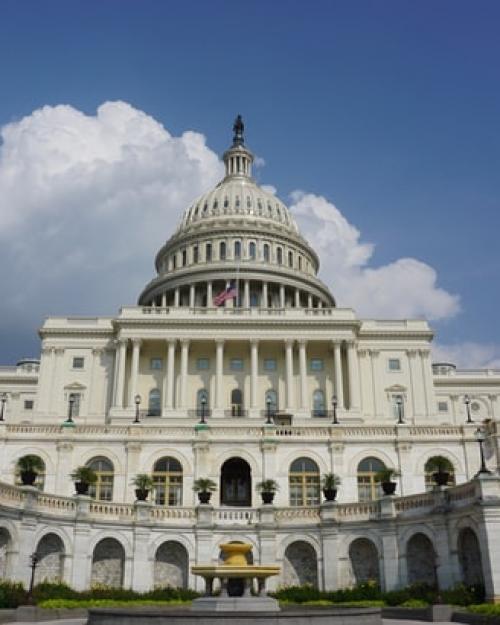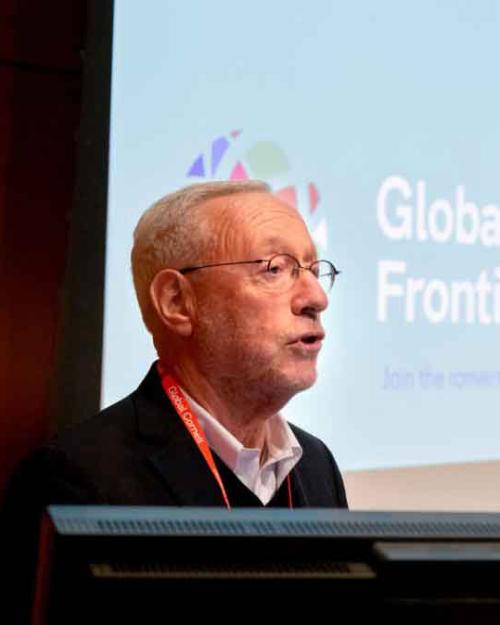International cooperation across universities and borders is imperative in our rapidly changing world, President Martha E. Pollack said in kicking off the two-day “Global Grand Challenges Symposium: Frontiers and the Future,” Nov. 16 in Rhodes-Rawlings Auditorium, in Klarman Hall.
“The last few years brought to light just how deeply and irreversibly interconnected our global society has become,” Pollack said, “where events like the war in Ukraine or a new virus can have rapid and profound impacts across a world that is increasingly volatile, unpredictable and extreme.”
Hosted by Global Cornell, the two-day symposium brought together more than 300 faculty, staff and students from Cornell and the new Cornell Global Hubs to discuss ideas for the next universitywide Global Grand Challenge.
Wendy Wolford, vice provost of international affairs and the Robert A. and Ruth E. Polson Professor of Global Development in the College of Agriculture and Life Sciences (CALS), reminded the plenary session audience that four years ago, stakeholders from across Cornell met for an inaugural symposium on the “greatest challenges facing humanity,” ultimately selecting Migrations.
Wolford said the richness of that experience suggests we can make a real difference working together across disciplinary silos and national borders, but “doing it well might require a transformation of the university itself,” she said, “a transformation of what we consider to be knowledge and how we produce it.”
The symposium featured five interdisciplinary panels on areas identified as critical challenges: knowledge; water; health; space; and international cooperation. More than 30 speakers – including faculty from across Cornell and Global Hubs universities – gave micro-talks on what they view as the most important worldwide challenges and how their research approaches them.
At the Nov. 16 plenary on knowledge and who defines and controls it, Vanita Shastri, Ph.D. ’95, dean of global education and strategic programs at Ashoka University in India, recalled her training as a traditional dancer: “Let’s discern methods of learning from these disciplines that have been there for thousands of years.” She suggested embracing “parity, perseverance, perspective and practice – so that whatever you do, you do it really well, and you contribute to knowledge and further humanity.”
Radice Family Professor of Law Chantal Thomas agreed. “Relativism is not the opposite of knowledge,” she said, noting that a plurality of perspectives should “encourage a broader conversation.”
In the Nov. 17 panel on water, speakers with backgrounds in ecology, engineering, history, city planning and economics said providing equitable access to sufficient clean water for people, plants, animals and energy production is both necessary and increasingly possible with new and older technologies, from AI to remote sensing and participatory design dialogues.
Victoria Beard, professor of city and regional planning in the College of Architecture, Art and Planning, focused on infrastructure to provide affordable, safe and reliable city water worldwide. “From the urban perspective,” she said, “this gets at the question, ‘Will there be water in the pipes?’”
Erastus Mwanaumo, senior engineering lecturer at the University of Zambia, expanded the discussion by highlighting groundwater contamination in informal settlements that lack piped water systems. “When we talk about contaminated water,” he said, “we really mean we have a problem on site. Sanitation creates this problem.”
Speakers on the health panel brought an equally wide range of perspectives, weighing in on biomedical disease and diagnosis, mental well-being, food security and ecosystem health.
“The biggest grand challenge is to make the world a better place – and in my perspective that means securing ecosystems and carbon supply,” said Claus Beier, head of the Department of Geosciences and Natural Resource Management at the University of Copenhagen, Denmark.
Rachel Bezner Kerr, professor in the Department of Global Development (CALS), warned that the way we currently produce food “is not good for people or the planet.” Bezner Kerr was a lead author on the Intergovernmental Panel on Climate Change’s 2022 report, “Climate Change: Impacts, Adaptation and Vulnerability,” and recently returned from the United Nations COP27 climate meeting in Egypt.
On the space panel, astronomers and physicists stood in agreement with humanists and anthropologists that humanity is at the edge of monumental changes in our relationship with outer space. Jonathan Lunine, the David C. Duncan Professor in the Physical Sciences in the College of Arts and Sciences (A&S), described advances in robotic space exploration that have transformed scientists’ understanding of other planets – and our understanding of our own.
Anindita Banerjee, associate professor of comparative literature (A&S), highlighted the reliance on speculation when studying outer space, calling it “not just catalyst for technology and science, but also method and epistemology.”
Themes of speculation and imagination were a connecting thread among the talks, including one from Mason Peck, the Stephen J. Fujikawa ’77 Professor of Astronautical Engineering (A&S). He described small next-generation spacecraft as a lower-cost, globally accessible way to do more science. “What do those spacecraft look like?” he asked. “These questions completely upend my discipline.”
On the symposium’s closing panel, Rachel Beatty Riedl, the Mario Einaudi Center for International Studies’ John S. Knight Professor of International Studies and professor of government in A&S and the Cornell Jeb E. Brooks School of Public Policy, identified four commonalities spanning the panels: questions of access and governance; responsibility across communities and generations; innovation and resilience; and the “tension between respect for local cultures and the universalisms implicated in scientific inquiry.”
The Cornell community is encouraged to join the conversation by completing this brief survey. Global Cornell will host a town hall in December for additional feedback and announce the new Global Grand Challenge theme in the coming year.
This story also appeared in The Cornell Chronicle.




